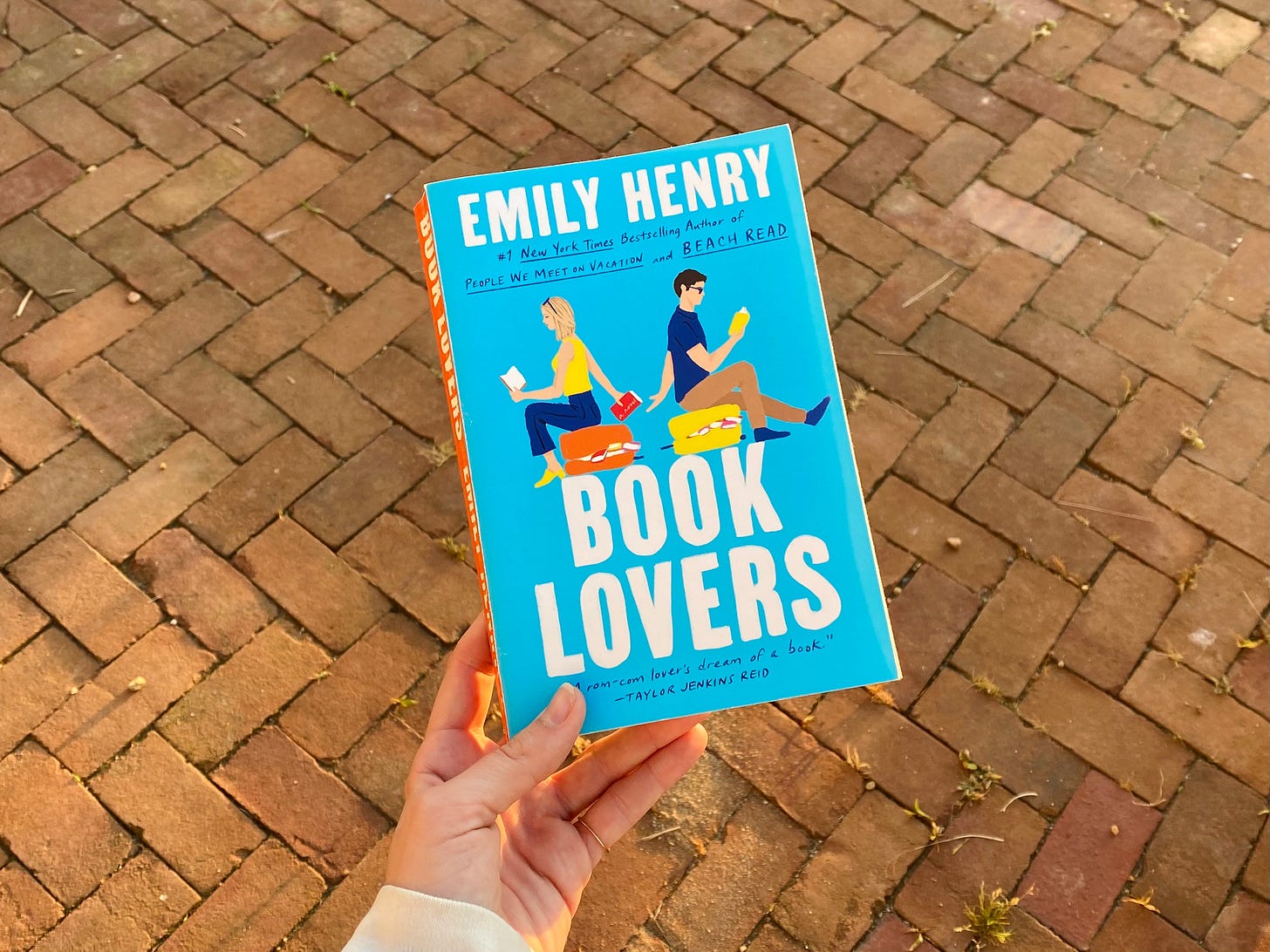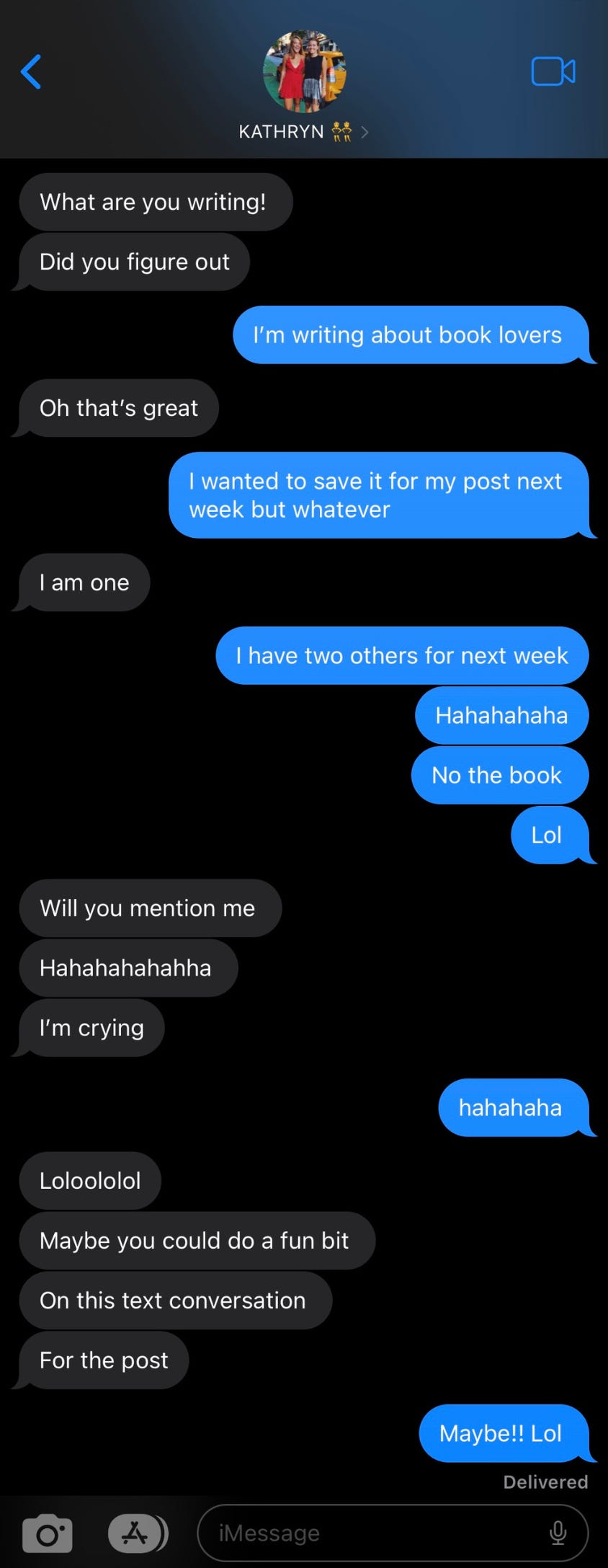Book Lovers—I Am One
Book Lovers by Emily Henry + other thoughts on summer reading and romance novels.
As difficult as it is to believe, summer is…here. In three short days, the hordes of white jean wearers will be released from their captivity. I’m prepared for an immediate temperature jump of at least 10 degrees, the city smells, the sweaty subway, the whole shebang. The sprinkler on the Christopher Street Pier will start sprinkling again, and I’ll be running through it to cool off.
The thing I’m really looking forward to though, the indisputable best thing about summer, is the reading. Few things bring me more joy than laying on the beach with a book, staying late into the afternoon when everyone else starts to leave. It gets cooler, but the sun is still warm, and if I could just pause the sun at 4:15pm, I could stay there forever. That is my happy place.
However, I find that even when I’m not doing stereotypical summer reading on a beach vacation—I will be spending the majority of the summer in the actual city—the steamy season still brings on an impassioned period of reading for me. My life won’t actually change that much. I’ll still be going into work five days a week. Maybe it will be slow enough for me to squeeze in a few pages at lunch, but that’s no guarantee. The summer reading uptick is a funny (and very welcome) holdover from school days, when summer actually meant endless free time.
Judging from the sheer number of summer reading lists floating around right now, I’m not the only one who feels that way. Also judging from these lists, my summer reading preferences are a bit peculiar. When I’m lazing about in the heat, instead of reading things that are light and fun and feel-good, I go for the heavier tomes, both in subject matter and in literal weight. I love nothing more than a 800-page intellectual and emotional clunker—Crime and Punishment, Middlemarch, A Little Life are all past summer reads of mine. There will be at least one this summer, so hopefully that’s something for all of us to look forward to.
That being said, it can’t be all clunkers all the time, and as you've probably already gathered, that’s not the direction we’re going in today. Today, I’m giving you my review of Book Lovers by Emily Henry—a book that surely appears on many, many summer reading lists. Although, maybe it gets beat out by Beach Read or People We Meet on Vacation or this year, by Henry’s new novel, Happy Place. I haven’t read any of those, so you’re getting Book Lovers. And I hope you’ll like it—I certainly did!
The curtain raises on our narrator and heroine, Nora Stephens, on her way to a very important meeting with a very important editor. She’s a very important literary agent, and her career is very important to her. She gets a call from her boyfriend Grant, who is in Texas helping his family’s big hotel conglomerate acquire a boutique hotel. He’s calling to let her know that it’s over. He’s decided to stay and help run the boutique hotel with the owners’ pretty daughter who he’s fallen in love with.
Sound familiar? Like a Hallmark movie…or perhaps like the source material for a Hallmark movie—a romance novel? Yes, Nora thinks so too. In fact, she self identifies with the villain in these types of stories. She is the cold city bitch, “the uptight, manicured literary agent, reading manuscripts from atop her Peloton” (3). It’s her trope. Except of course her exaggerated, self-deprecating view of herself means that she’s not actually that person at all. She’s thoughtful and loving—just protective of her heart and of her career.
To prove it, she has a sister named Libby who she loves very much. They were raised by a single mother in a small but cozy apartment above a dreamy bookstore called Freeman’s. Their mother passed away suddenly when Nora was in college and Libby was in high school, so it’s just the two of them now. Libby is pregnant with baby number three, and asks Nora to go on a sister trip to a small town in North Carolina called Sunshine Falls. A small town in North Carolina that happens to be the setting of the last novel Nora worked on. Remember the very important meeting with the very important editor? That was Charlie Lastra, and Nora was pitching the novel in question. He rudely refused it, and now it’s a best seller.
Nora can never say no to Libby, and she’s been feeling a distance in their relationship that she’s not used to. The hope to reignite their usual closeness is the nail in the coffin, so off they go. The first morning in Sunshine Falls, Nora heads to the only coffee shop in town—Mug + Shot because everything in this town is named punnily—and runs headlong into a very handsome, very big, very blonde, winking man. Oh my gosh, and then there’s a handsome dark haired man with a chiseled profile waiting in line. There must be something in the water. Wait a minute…is that Charlie Lastra?
Spoiler alert: it is! I don’t want to give anything away, but I will reveal that the charming blondie is a diversion, unessential to the plot line. I don’t care for love triangles in my romance novels, and I don’t want to scare off any readers who feel the same way. Now that I mention it though, it’s a perfect segue into what I want to say about this book.
Romance novels are defined by their tropes. The love triangle is just one of them. There’s enemies to lovers, forced proximity, the locked up heart, can never hurt like that again, the stormy eyes, deep puddle soul. The list goes on. Henry includes as many of these as humanly possible. BUT, much like the reference to a love triangle that doesn’t actually become a love triangle, none of these tropes play out the way you would expect them to. Which I guess makes them…not fully tropes.
She’s able to reference them, and almost pay homage to them, without fully committing to them. Importantly, she manages to avoid committing without making that avoidance feel derisive. For example, she nods to the checklist trope, in which one character has a list of things they must do because their sister wants them to, and one of the items is going on a date with a local hottie. Untraditionally, in Book Lovers, when the hottie finds out about the list, he wants to help her check everything off instead of turning it into the central conflict.
It’s meta—a piece genre fiction arguing that yes, genre fiction funny and flirty and somewhat predictable, but that doesn’t mean it needs to be separated out and looked down upon. Yep—I’m back on my “justice for genre fiction” soapbox. I use the term genre fiction, which encompasses many different types of writing. It should go without saying that among these categories, romance suffers disproportionately. With romance becoming increasingly mainstream, that’s hopefully going to change. By engaging with romance novel tropes in a positive way, Henry participates in this conversation with extra intention.
However, the fact that her protagonists are in the publishing industry introduces a little bit of a wrinkle. Nora and Libby grew up around books. Their mom loved romances, and because of that Libby does too. Nora reads them, but either skips to the last page and then no longer cares to read the rest, or she ends up throwing the book at the wall. They’re just not really her thing, which is fine for your average civilian reader, but like I said—publishing industry.
Notably, Henry never explicitly tells the reader what kinds of authors Nora represents. From the bits and pieces throughout, my hunch is that we’re supposed to guess that they fall somewhere between mainstream commercial and literary fiction. We also don’t get any concrete info about the types of books Charlie edits, but once the pair develop a working relationship we can assume that there is overlap.
At one point Nora sends him a Yeti fantasy romance out of her slush pile as a joke. They enjoy it and laugh about it. Yeti fantasy romance doesn’t sound good to me either, but it’s not a far hop from werewolf fantasy romance, which is in high demand in certain reading circles. Those are not the types of books that Nora and Charlie work with.
Maybe it would have been too on the nose to make Nora and Charlie a romance agent-editor duo. Not doing so though makes a statement whether Henry means for it to or not. Still, I don’t really fault her because it’s hard to escape the separatism. Romance novels (genre fiction) are different from literary fiction. It’s the assignment of inherent value based on said differences that’s the problem.
Reading this book also made me reflect on my own perception of genre fiction—mainly romance for me.1 Earlier in this very post, I differentiated between light, fun, feel-good reads, and “emotional clunkers.” I know what the subtext is there—I’m saying in the summer I don’t opt for genre fiction. I like to read literary fiction. Does that make me a fraudulent crusader? Among the romances I’ve read, the majority are regency. Those are the ones I really love, and I find myself rolling my eyes (just a little) at tropes in contemporary romances that would have me squealing with delight in a regency romance.
Why is that? Is it because I’m more judgmental and snobbish about my reading that I think? Do I need the historical, temporal displacement to add a layer between reality and my romance reading to make it enjoyable? Can I fool myself into thinking that romance is more “high-brow” when the dialogue is old-timey and the characters wear fancy clothes and they get in trouble if they’re seen touching hands outside of a dance hold?
I don’t have the answer, and sometimes I twist myself into a mental pretzel thinking about it. The bottom line is that I think Emily Henry made a valuable contribution to the conversation, even if she didn’t do it perfectly. I had a good time reading this novel. It made me smile and it made me think. And oh my god, the last chapter was an absolute delight. What more could you want? I get why it shows up on summer reading lists, but it’s not only good for summer. You could read it in October or February or May, and it would be good then too.




I am one!!!!!!